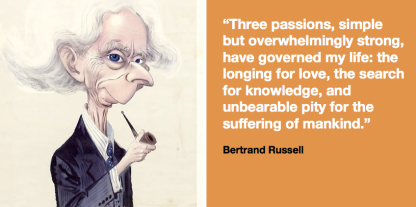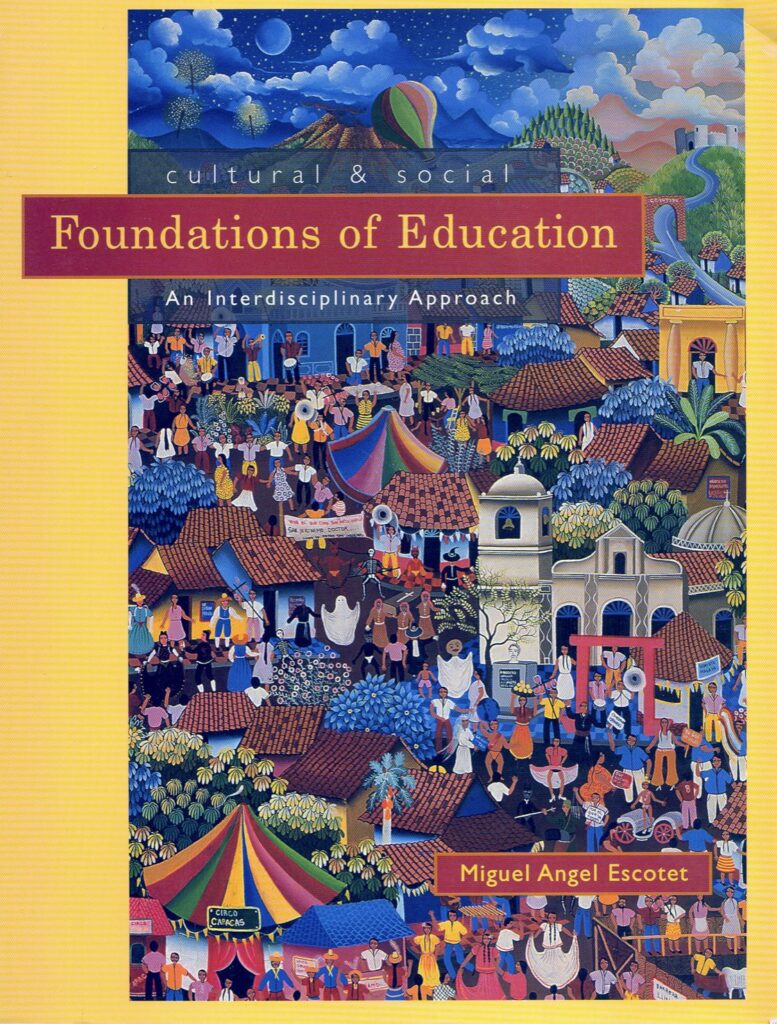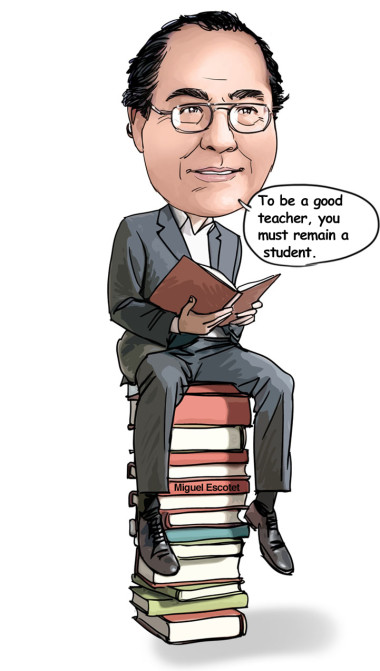
- April 16, 2022
- Educational Philosophy, Essay, Ethics, Higher Education, Psychology, Social Philosophy
Education should prepare the human being for ongoing change and for the eventual crisis that might arise as a result of the transition.
I believe the aim of education should be to build in each student strong theoretical foundations, to help future teachers to be educated rather than trained, to be capable of understanding the complexities of the organic society —Gemeinschaft— rather than just the reduction of people to human material —Massenmensch. I have always been uncomfortable with labels, recipes, and linear models for preparing teachers at all levels. While I appreciate their need to develop and learn teaching methodologies, we must always remember the dependent relationship between theory and praxis; both should be interrelated. There is no applied scientific discipline if there is no discipline to apply. In teacher education programs we often emphasize the learning of methodologies, content information, and skills to the detriment of what constitutes the core of education which is learning to be. Very little learning is related to the dimensions which require an understanding of ourselves, of others, and of the world in which we live.
Besides these important social and cultural factors, educational systems should change the present institutional  culture. We need to evolve towards a society for learning based on the idea that all members are constantly learning, each being helped by the other. Today’s education is overly centered on the “teaching person” rather than on the “learning person”. We teachers must allow the learning community to create an environment in which students learn from the teacher, the teacher from the student, and everyone from each other. Centering education on the learner modifies the teacher’s role to one which is in harmony with future demands for a learner, a facilitator of learning, and a helper in the affective and emotional development of people. More stress should be placed on such domains, which intrinsically relate education to psychology, sociology, anthropology, and philosophy.
culture. We need to evolve towards a society for learning based on the idea that all members are constantly learning, each being helped by the other. Today’s education is overly centered on the “teaching person” rather than on the “learning person”. We teachers must allow the learning community to create an environment in which students learn from the teacher, the teacher from the student, and everyone from each other. Centering education on the learner modifies the teacher’s role to one which is in harmony with future demands for a learner, a facilitator of learning, and a helper in the affective and emotional development of people. More stress should be placed on such domains, which intrinsically relate education to psychology, sociology, anthropology, and philosophy.
In addition to mastering knowledge, thinking critically, and being problem-solvers, teachers should learn tolerance, ethical behavior, aesthetic sensitivity, and moderation of superfluous elements. We must help future people to be free from prejudices, where learning to care, learning to share, learning to grasp the whole and act on the parts, learning to be, and learning to carry on learning should be some of the society’s main objectives. Such variables are my major concern. We must infuse these cognitive and affective dimensions into the core of all teacher education programs. Whether the future will be more humane than our past can be determined only by our future efforts. I try in my courses to educate for such a future by helping my students to develop knowledge and sensitivity about the complexity and the multiplicity of elements within the science of education and to understand their relationship to the “learning person” in constructive partnership.
In summary, my goal is to support students as they master a particular body of knowledge, including modes  of thinking, problem solving methods, essential facts, theories, and ideas, and the culture and ethics specific to the disciplines that I teach. I want to help students learn about the subject matter appropriate for the course, I want to help them to grow as learners, and I want to help them to grow as people. This means also, build-in intercultural concepts and inter-ethnic harmony to reduce ethnocentrism and social encapsulation. Members of the university community exercise participation in knowledge-building within the context of a collective consciousness which leads them towards an extra-territorial and extra-cultural commitment. i.e. universality in the sciences and the arts.
of thinking, problem solving methods, essential facts, theories, and ideas, and the culture and ethics specific to the disciplines that I teach. I want to help students learn about the subject matter appropriate for the course, I want to help them to grow as learners, and I want to help them to grow as people. This means also, build-in intercultural concepts and inter-ethnic harmony to reduce ethnocentrism and social encapsulation. Members of the university community exercise participation in knowledge-building within the context of a collective consciousness which leads them towards an extra-territorial and extra-cultural commitment. i.e. universality in the sciences and the arts.
Students belong to a diverse society in all respects. Students learn in many different ways; thus I try to help them in multiple ways in approaching new material. I do my best to be flexible and to provide them alternate routes to knowledge and understanding, even though not always with success because the burden of connecting does not rest entirely on the instructor. The choice of appropriate tools and techniques is dependent on the nature of the student and the specific aims of the course. For instance, readings and lectures can motivate and outline material; research, homework, and simulations can help students develop a deeper understanding; newsgroups, cooperative learning, and discussions can facilitate student interaction and awareness of the affective domains of learning; libraries, databases, and the Internet can provide access to current information, while student papers, exams, presentations, and projects can encourage critical thinking and effective communication.
However, not all students will respond to the same teaching techniques. Some may learn well from traditional lectures, while others may respond better to discussion groups, group projects, written exercises, creative tasks, or demonstrations. I believe that it is important to use a combination of these and other methods to guide different students towards subject proficiency in the way most natural for them. I offer myself to my students as an individual mentor, helper, and guide, especially with graduates. I am available to students in person, by phone, or Internet and I encourage them to share with me any issue, achievement, or failure that they experience during the learning process. Further, I believe that students need to feel confident gaining new information and making it their own. They learn when they are engaged. Teaching is the most effective when students are actively participating in the process.
As a professor, I have done and will continue to do almost anything effective to help students learn. I specifically model what I teach and move words into action. We learn ethics, freedom, and tolerance by behaving ethically, being free, tolerant, and flexible. This does not mean that I lower my standards for students. I always set high standards, but then I do everything I can to help the students reach them. My philosophy is translated into actions such as my decision to never grade on a curve, which I believe only discourages students who feel they can never win. The use of curves undermines confidence and does not foster a positive non-competitive learning atmosphere. In large classes, I make a particular effort to be available for individual attention and I try to maintain a mix of my teaching and advising responsibilities. To achieve this, I assign students to small groups and I work with them individually on special projects. At the same time, I do not see participatory learning as a distinct methodology. It is an underlying principle for all types of effective instruction. Even in large lectures, there is room for some form of participation. Whenever possible, I use real-world examples and studies. When the nature of the material or enrollment requires me to lecture, I do so, but I go beyond textbooks and content discussions. Moreover, I always incorporate interdisciplinary aspects which allow students to explore the relationship between different fields to be capable of understanding the whole before they can approach its parts.
freedom, and tolerance by behaving ethically, being free, tolerant, and flexible. This does not mean that I lower my standards for students. I always set high standards, but then I do everything I can to help the students reach them. My philosophy is translated into actions such as my decision to never grade on a curve, which I believe only discourages students who feel they can never win. The use of curves undermines confidence and does not foster a positive non-competitive learning atmosphere. In large classes, I make a particular effort to be available for individual attention and I try to maintain a mix of my teaching and advising responsibilities. To achieve this, I assign students to small groups and I work with them individually on special projects. At the same time, I do not see participatory learning as a distinct methodology. It is an underlying principle for all types of effective instruction. Even in large lectures, there is room for some form of participation. Whenever possible, I use real-world examples and studies. When the nature of the material or enrollment requires me to lecture, I do so, but I go beyond textbooks and content discussions. Moreover, I always incorporate interdisciplinary aspects which allow students to explore the relationship between different fields to be capable of understanding the whole before they can approach its parts.
I believe that being a teacher involves much more than just imparting facts and methodologies; my major challenge lies in inspiring students and facilitating their efforts to become self-educators. Learning as I said before, is a lifelong process that does not end when a class is over or a degree is conferred, particularly for future teachers. I do my best to motivate them towards such a goal. To this end I have developed different resources, such as an Internet site, to allow students to practice that experience of self-learning by interacting with other dimensions and then by teaching the teacher their newfound interpretations. These types of strategies help students foster the ability to search for information, as well as to select and interpret that information. Given the demand for quality education, I do not measure excellence in terms of the amount of knowledge accumulated, but rather the capacity to evaluate the possibilities and limitations of that knowledge. This is one of the reasons I use a wide range of evaluation techniques to reduce, as much as I can, the inevitable subjectivity of measuring learning and the most difficult task of formal teaching.
In summary, education should be related to an intercultural and interdependent world. A world in which education teaches man to foster sharing attitudes, to compete with oneself and not with others. Learning to be tolerant, developing aesthetic sensitivity, ethical behavior, and moderation of superfluous elements, and developing pity and solidarity for the suffering of mankind. A world free from prejudices, where learning to care, learning to share, learning to be, learning to grasp the whole and act on the parts, and learning to carry on learning should be some of society’s main objectives.
My several decades of teaching have encompassed everything from elementary education to graduate education, from a traditional system to distant or online learning and non-formal systems, and they have taught me what can be effective. I have pursued multiple techniques: guided research, live-in learning-work courses, guided didactic conversations, lectures, field seminars, negotiation games, individual or small group projects, distant and programmed techniques, and so on. But above all, I have learned that I need to evolve every single moment to keep innovation as part of my teaching; to practice research as a way of improving my strategies, being updated and searching for knowledge; to behave more as a learner than as a teacher; to help students develop objective criticism and search for new channels for a more enlightened future. I strongly believe that to be a good teacher you must remain a student.
Thus, the best learning strategies that I have experienced are to teach interactively the search for knowledge, to practice the highest ethical standards, to treat students with respect and concern for their achievement, and to be dedicated to my profession with love and full commitment. However, I am by no means satisfied and I am still searching for ways to improve my teacher-learner responsibility.
_________________
©2022 Miguel Angel Escotet. All rights reserved. Permission to reprint with appropriate citing. Based on my previous writing and teaching practices in all levels of education, from early childhood education to post-doctoral.